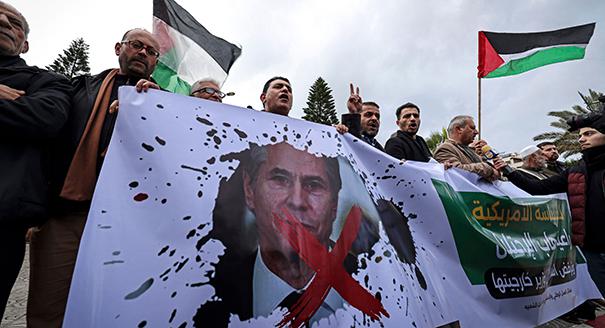Many items were on Secretary of State Antony Blinken’s agenda during his recent two-day visit to Israel and the occupied Palestinian territories: Iran, Russia, the fate of Israeli democracy. And added to his agenda just as he was headed out the door was the escalating violence in the West Bank, which saw Israel’s military killing ten Palestinians in Jenin refugee camp and a lone Palestinian gunman shooting seven Israelis in Jerusalem.
Unlike Palestinian attacks against Israelis which are, for now, exceptional, Israeli state violence against Palestinians has been ratcheting up since spring 2022 under the Naftali Bennett-Yair Lapid government, with raids on Palestinian towns and refugee camps becoming daily occurrences. Though Blinken gently prodded Israeli Prime Minister Benjamin Netanyahu to deescalate the situation, no hint was given before or since his travel to the region that the Biden administration might consider suspending security assistance to Israel when it is used for offensive purposes against Palestinians—as required by U.S. laws—or that it might withhold the diplomatic cover it provides Israel in international forums. Washington’s support for Israel remains unconditional.
But should it be unconditional when Palestinians in two West Bank communities are facing mass expulsion—one so that Israel can use their village as a firing zone, and another so that a Jewish settlement can be built that will cut the West Bank in half, ending prospects for a contiguous Palestinian state? Or when there is no accountability for the killing of Palestinian civilians, including women and children, not even when it involves the targeting of an American journalist wearing a vest and helmet clearing marked “Press?”
Palestinians are left wondering where is the Biden administration’s commitment to human rights and values when Palestinian lives are involved. Asking Netanyahu to deescalate is not going to be enough, especially when he is depending on his coalition partners to keep him out of jail—partners who espouse notions of Jewish supremacy, are bent on ending Muslim control over the Al-Aqsa Mosque Esplanade, and want to see Israel’s armed forces given free rein to deal with “terrorists.” Yet to leave off the table the possibility of deploying U.S. leverage to disincentivize the worst impulses of Israel’s far-right government guarantees that the violence will rise and that Palestinians, as the occupied people, will pay the highest price.
The lack of meaningful U.S. engagement and the Biden administration’s refusal to readjust its priorities in the region is what Netanyahu is banking on. Barely before Blinken had the chance to leave Israeli airspace, Netanyahu told CNN in his first U.S. interview that he had no intention of relaunching peace talks with Palestinians because what he planned for them was not a state. His idea of a “workable peace,” he said, involved allowing Palestinians to govern their civil affairs in territory under Israel’s effective sovereignty, without the possibility of extending any political rights to Palestinians. To be clear, Netanyahu unabashedly gave the legal definition of apartheid as his “workable peace” for Palestinians.
When asked for a response, the State Department spokesman pivoted and instead pointed to Blinken’s announcement of $50 million more dollars in humanitarian aid to Palestinians, and the administration’s search for “innovative ways” to expand their access to 4G technology in the occupied territories and increase the supply of renewable energy. This was all said without any self-consciousness that it is Israel that is preventing Palestinians from accessing 3G, 4G, and 5G technologies, and systematically destroying EU-funded renewable energy infrastructure in the West Bank, while denying the entry of material for the expansion of solar power in Gaza.
So what’s next for Palestinians if there is no two-state solution and no Israeli plans to extend them citizenship and equality in the state of Israel? Palestinian President Mahmoud Abbas and those around him may be finally taking Netanyahu and his coalition government at their word. Weeks after the Israeli elections, a group of Palestine Liberation Organization (PLO) and Palestinian Authority (PA) officials, along with representatives of the Boycott, Divestment, Sanctions Movement, the Palestinian Human Rights Organizations Council, and the Palestinian Nongovernmental Organization Network, a coordinating body for much of the Palestinian nongovernmental organization sector operating in the occupied territories, held a series of meetings. This led to the convening of the first “Palestinian National Conference” to discuss where the Palestinian national movement goes from apartheid. The resolution they adopted was historic in that it recalibrated the Palestinian liberation struggle to one that deemphasizes the two-state solution to one that embraces a more wholistic understanding of the nature of the challenges that Palestinians face.
The resolution recognizes the right of the “entire indigenous Palestinian people” to its “national territory.” This is a significant departure from PA officials who are used to punctuating their remarks with references to the “pre-June 4, 1967, Green Line with East Jerusalem as the capital”—a two-state solution catchphrase. The resolution also demands equality for Palestinians in the “1948 areas,” inside Israel proper. A just and durable solution, it says, would require the imposition of a boycott, divestment, and sanctions campaign against Israel and accountability for rights violations before the International Criminal Court. Directed at “governments, parliaments, and political parties, in the Arab world and globally” and regional organizations and the African Union, the resolution is the antipode to the U.S.-championed Negev Forum (and the associated Abraham Accords), which calls for Israel’s regional integration as a means toward Israeli-Palestinian peace.
What may be a major reorientation of the Palestinian struggle has not made it on the United States radar for now. The PLO and PA leadership has been known to take up new initiatives—like the bid for full United Nations membership in 2011–2012—only to abandon them later when negotiations came back online. This time may be different, however. The United States does not want to play the part of peace broker and Palestinians have no options other than, with global support, resisting nonviolently (or, increasingly likely now, violently) the “workable peace” that Israel has planned for them.






